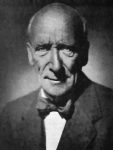 Algernon Blackwood (1869-1951) was a UK writer, a prolific author of novels and short stories for half a century. His novels of occult pantheism—best exemplified in The Centaur (1911), which builds on the theories of Gustav Fechner in its projections of a sentient Mother Earth—tend to argue a logic of history which seems sufficiently rational for some of his work to count as sf. This is particularly true of the Le Vallon sequence, Julius Le Vallon (1916) and The Bright Messenger (1921). The first is primarily an occult novel regarding an individual who retains memories of past lives and who seeks to remedy an error caused in that life when trying to raise a fire elemental. The remedy misfires and the elemental takes over the body of a baby still in the womb. The second novel explores the life of that child as he matures in the form of a new uber-being for a New Age.
Algernon Blackwood (1869-1951) was a UK writer, a prolific author of novels and short stories for half a century. His novels of occult pantheism—best exemplified in The Centaur (1911), which builds on the theories of Gustav Fechner in its projections of a sentient Mother Earth—tend to argue a logic of history which seems sufficiently rational for some of his work to count as sf. This is particularly true of the Le Vallon sequence, Julius Le Vallon (1916) and The Bright Messenger (1921). The first is primarily an occult novel regarding an individual who retains memories of past lives and who seeks to remedy an error caused in that life when trying to raise a fire elemental. The remedy misfires and the elemental takes over the body of a baby still in the womb. The second novel explores the life of that child as he matures in the form of a new uber-being for a New Age.
Blackwood is best remembered for his numerous short stories, notably those about his occult detective John Silence (see ebook below), which uses some pseudoscientific techniques such as the application of drugs to open awareness to a spiritual world in “A Psychical Invasion”. His earliest known fiction is a simple ghost story, A Mysterious House (1889), but his work soon built into a central concept featuring a pantheistic sense of reality driven by elemental forces which can work through other dimensions. Blackwood’s belief in other dimensions, or “higher space”, as he called them, fuels several of his later stories. He enjoyed the phrase “elsewhere and otherwise”, believing that people might slip through into a higher dimension and either reappear at a great distance, as in the later John Silence story “A Victim of Higher Space” and “The Man Who Was Milligan”, or be trapped in higher space, aware of our plane of existence but unable to make contact, as in “Elsewhere and Otherwise”.
His short fiction can often reach heights of brooding lyricism as in “A Descent Into Egypt” where a man’s spirit has such an affinity with the immensity of the age of the Earth that it is absorbed into the past; or “Onanonanon”, where a man who had created an alter ego for his wartime espionage finds himself haunted by his other self. Blackwood was fascinated by the concept and implications of Time which manifests itself in many of his stories.”The Man Who Found Out” features an ancient record, the “Tablets of the Gods”, whose message – including the revelation that Time is a delusion – has Basilisk-like effects on readers. Overall, Blackwood is best understood as an author of supernatural fiction with cosmic aspirations in which guise he was a significant influence on H P Lovecraft and his circle.
(Edited from Blackwood’s entry at the Encyclopedia of Science Fiction. Click the link for the full article.)





